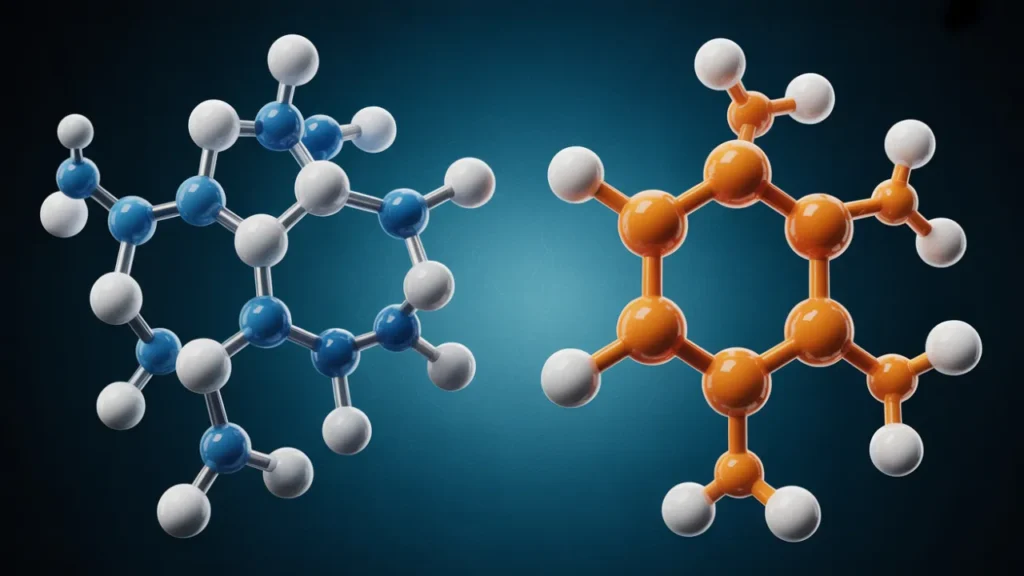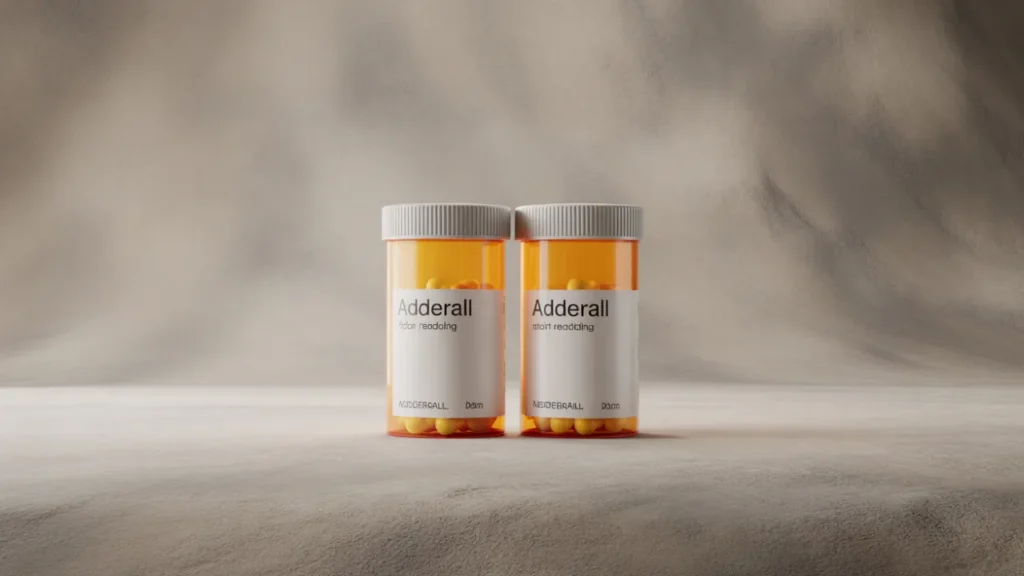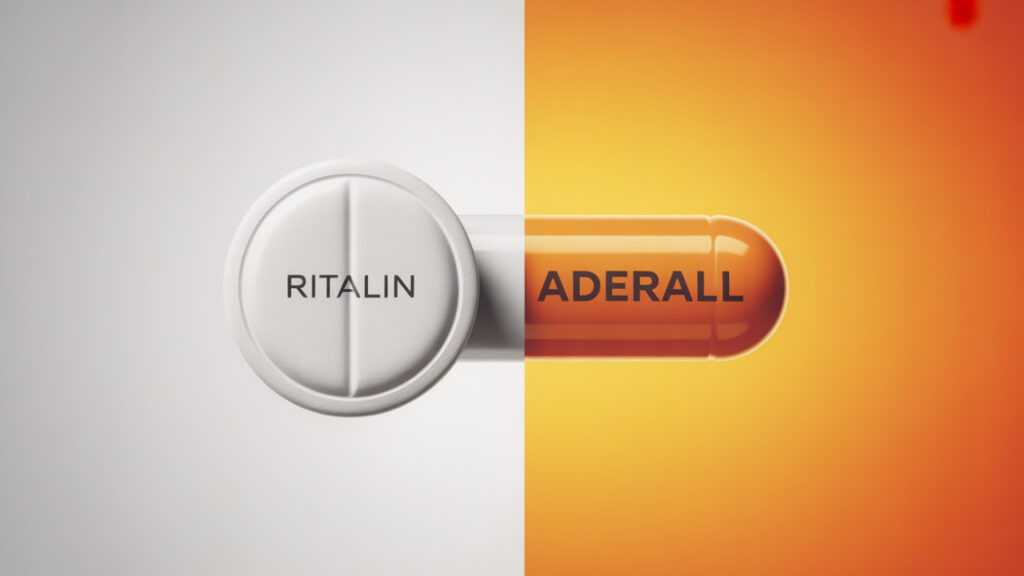Ritalin Vs Adderall: What Patients Need To Know
Ritalin vs Adderall is a common search for people comparing ADHD treatments. Both help with attention deficit hyperactivity disorder and improved attention. They are different drugs and can feel different in daily life.
How Each Stimulant Acts On The Brain’s Chemistry For Focus And Calm
Ritalin contains methylphenidate, while Adderall contains amphetamine salts that include dextroamphetamine. Both increase dopamine and norepinephrine in the brain. This effect boosts focus, task initiation, and follow-through.
Both stimulants act on the central nervous system to increase alertness. They can also reduce impulsive behavior and improve work completion. Many patients report fewer missed details and better time use.
Response varies by patient due to genetics, sleep, and diet. Some people feel smoother focus on methylphenidate. Others find better efficacy with amphetamine.

Formulations, Release Profiles, And What “Dose” Usually Means In Practice
Each drug comes in immediate-release and extended-release forms. Release timing shapes when you feel benefits and when side effects peak. A dose change can shift morning energy or afternoon focus.
Immediate-release tablets act fast and wear off sooner. Extended-release capsules cover school or work blocks with fewer redoses. Your clinician matches dose to your schedule and goals.
Dosing is individualized for safety and function. You start low, then adjust based on benefit and side effect patterns. Never change a medication or dose without your prescriber.
Core Similarities And Key Differences
Both are stimulant medications with controlled substance status. Both can raise heart rate and blood pressure. Both can cause insomnia when taken too late in the day.
What Feels Different Day To Day For Work, School, And Home
Some people describe Adderall as more “activating.” Others feel Ritalin is cleaner and shorter in action. You test and track outcomes to find what fits.
Appetite change may appear on either drug. Mood shifts like irritability can occur, especially as a dose wears off. Good sleep hygiene helps reduce rebound issues.
Both options can work well when paired with therapy and structure. Skills plus medication improve attention and follow-through. This pairing often reduces stress and pressure around deadlines.
Efficacy And Side Effects In Everyday Life
Efficacy means real gains in output and fewer errors. It also means better planning and less procrastination. Balanced energy is the goal, not a “wired” feeling.
Common Side Effects: Insomnia, Anxiety, Nausea, And Irritability
Insomnia can appear if the dose is high or taken late. Moving the timing earlier can help sleep. A smaller afternoon dose or no second dose may also help.
Some patients feel anxiety during peak effect. Breath work, brief walks, and CBT skills reduce this. Your prescriber can also adjust the medication plan.
Nausea may occur on an empty stomach. A small protein snack often helps. Report persistent nausea to your clinician.

Blood Pressure, Heart Rate, And Central Nervous System Effects You Should Watch
Stimulants can raise heart rate and blood pressure. Share any history of cardiac issues with your provider. Report chest pain, fainting, or severe headache right away.
Both drugs stimulate the nervous system. You may feel jittery if caffeine is high. Hydration, regular meals, and steady sleep protect health.
Track side effects for two to four weeks after changes. Use a simple daily log for mood, focus, and sleep. Bring that data to visits for clear decisions.
Safety, Risks, And Controlled Substance Considerations
Ritalin and Adderall are controlled substances. Safe storage in a locked location is smart. Never share your medication with anyone.
Misuse, Addiction Risk, And Safe Practices That Reduce Harm
Misuse can lead to dependence or addiction. Take only what is prescribed. Keep pills in the original bottle with your name.
Set clear rules in shared homes or dorms. Count pills once a week to catch any loss. Ask your prescriber about safe disposal of extras.

Drug Interactions, Red Flags, And When To Call A Clinician
Tell your clinician about all medication and supplement use. Certain drugs can raise stimulant levels or change side effect risk. Alcohol can worsen insomnia and irritability.
Call your provider for severe anxiety, mood swings, or new tics. Call sooner for chest pain, shortness of breath, or fainting. Safety comes first before productivity.
Choosing Between Ritalin And Adderall With A Clinician
Both can help attention and executive function. The best choice depends on your goals, schedule, and side effect patterns. Your history with other meds also matters.
Trial Process, Titration Steps, And How To Measure Efficacy Clearly
Start with baseline notes for focus, task length, and errors. Try one medication and titrate slowly. Keep meetings short and focused on outcomes.
Measure school or work output in simple metrics. Use time-on-task, number of starts, and number of completions. Share those numbers at follow-ups.
Consider weekends and family routines in the plan. Some prefer shorter-acting coverage on off days. Others keep a steady extended-release schedule.
When To Consider Non-Stimulants, Combination Approaches, Or A Switch
If side effects limit gains, ask about non-stimulants. Some patients do better with a different class. Others do well with a lower stimulant plus therapy.
Anxiety or sleep issues may respond to skill work and timing changes. Gentle exercise can smooth energy across the day. Nutrition steadies the brain and the central nervous system.
Switches are common when efficacy plateaus. Your clinician will guide safe transitions. Never stop a medication without medical guidance.
Therapy And Skills That Strengthen Outcomes
Medication helps the brain engage. Therapy builds habits that keep results stable. This pairing supports long-term mental health.
CBT And DBT Skills That Support Attention, Behavior, And Daily Systems
Cognitive Behavioral Therapy trains cue-response awareness and planning. You break tasks into steps and set friction-free starts. You learn to notice unhelpful thoughts and replace them.
DBT adds skills for distress tolerance and emotion regulation. Short breathing drills lower nervous system arousal before work. Brief mindfulness resets focus in minutes.
Habit design makes gains stick. Use visual timers and single-task sprints. Protect sleep to reduce irritability and improve learning.
Lifestyle Habits That Support Brain Health And Reduce Side Effects
Set steady wake and bed times. Screen-off time before bed reduces insomnia risk. Morning light helps circadian rhythm.
Eat protein with breakfast and lunch. This stabilizes energy and mood. Hydration supports blood pressure and heart rate balance.
Keep caffeine modest when on a stimulant. Track how coffee changes jitter or anxiety. Adjust your routine to protect health.
Psychiatry And Medication Management For Adults With ADHD
Our psychiatry and medication management team monitors dose, timing, and side effect trends. We adjust methylphenidate or amphetamine plans to fit your day. We review heart rate, blood pressure, sleep, and appetite on every visit.
If you need an alternative, we discuss non-stimulant options. We also look at interactions with any other medication. Your safety guides each step.
Therapy, ADD Treatment For Adults, And Local Care Near You
Our ADD Treatment for Adults blends CBT, DBT skills, and practical coaching. We build routines that reduce pressure and support consistency. We align the plan with your goals and values.
Cost, Access, And Your Next Steps
Coverage questions can slow progress. We help you move fast. Bring your insurance card and a short goal list.
Insurance Verification And A Free Consultation CTA
We can verify insurance benefits and explain your options. Call us or use our online insurance verification tool. Schedule a 15-minute consult to map your next step.
Bring questions about side effect concerns, insomnia, or anxiety. Ask about skills that reduce rebound irritability. We will review a clear plan for your first month.
Final Thoughts On Ritalin Vs Adderall
Both medications can support strong outcomes when used correctly. The best choice is the one that helps you do the work and feel well. Pair medication with therapy to lock in gains.
This article is for education only and is not medical advice. Always consult your clinician before starting or changing any drug or dose.
How Revival Mental Health Supports Your Next Step
Revival Mental Health offers psychiatry, therapy, and skills support for adults. We help you evaluate Ritalin vs Adderall and find a steady plan. We focus on function at work, school, and home.
- Call today to schedule psychiatry and therapy.
- Use our quick insurance verification to check benefits.
- Ask about CBT and DBT skills plus medication management.
Our Orange County clinics serve Irvine, Newport Beach, Costa Mesa, Laguna Beach, Tustin, and Huntington Beach. We help with evaluation, dose adjustments, and therapy that improves follow-through. Use our insurance verification tool and set a 15-minute consult today.
FAQs
- Is one better for creativity or deep work, or do both help in the same way? Both can help deep work by raising dopamine and norepinephrine, but results differ by person. Track your best focus windows with each option. Share that log with your prescriber to guide adjustments.
- What should I do if I feel a “crash” in the late afternoon? Talk to your clinician about timing or formulation changes. A small schedule shift or a different release profile can help. Skills like a brief walk and a protein snack also reduce the dip.
- Can I use caffeine while taking a stimulant medication? Many people can, but caffeine may raise jitter or anxiety. Keep intake modest and log effects on sleep and focus. Share patterns at your next visit for a safe plan.
- How do I talk with my employer or professor about ADHD support without sharing private details? Prepare a short, practical request for tools like quiet space or flexible timing. Focus on tasks and outcomes rather than diagnosis. You can share a letter from your clinician if you choose.





